UPDATED January 2025
In our ultimate guide to death records, you’ll find out what death records are and how you can use them in a people search.
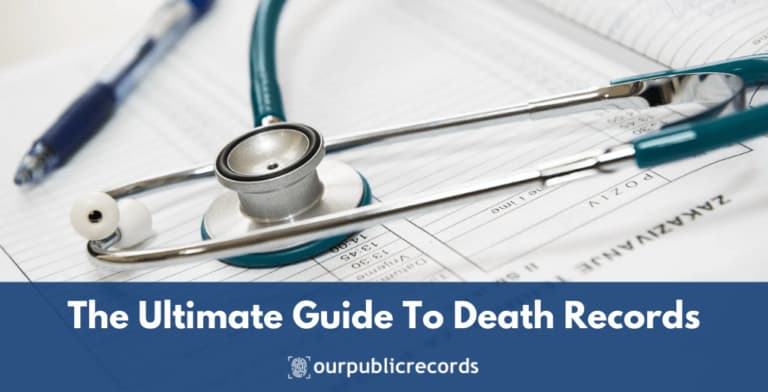
When it comes to finding a missing person, you might scour the web and check every social media site that you can find without thinking about checking the death records. As much as you want to believe that a missing person is just missing, there is a chance that the person passed away. Grateful Doe is one of the more famous cases. This was a name given to a young John Doe who died in a 1995 car accident in Virginia. Though investigators attempted to find his true identity, it wasn’t until 2015 that they found his real name. Jason Callahan left his mother in 1995 to follow the Grateful Dead and died in a car accident on his way to a show. Believing that he willingly left his old life, she never filed a missing person’s report and didn’t learn of his death until a decade later.
You must look through death records when you need to track down a missing person. At OurPublicRecords, we can help you find the death records in any state, including both modern and historic records. Our ultimate guide to death records will both help you start your search and assist you in finding all the records that you need.

Finding online death records from the comfort of your home is easy with our ultimate guide to death records.
What are Death Records?
Finding public records is as easy as checking the city or county where you want to search. Many cities and counties now have public records searches that are free to use. In just a few clicks, you can read an arrest report from the past weekend and see lawsuits filed decades ago. Finding death records is a little more difficult because that information isn’t always available to the general public. Think about it this way: if a loved one passed away from a drug overdose, would you want anyone to find the report and read it online? Some death records are not public knowledge because the coroner and others want to respect the privacy of the deceased.
A death record is essentially a document that lists the official cause of death. If a loved one recently passed away, you’ll receive at least one copy of the report from the funeral home. That does not mean that the funeral director or the home itself writes that report. This is a common misconception. The funeral home is responsible for helping you plan the funeral. During your initial meeting, you can request one or more official copies of the death report. You generally need this report to have the utilities shut off at the deceased’s home and to cancel his or her credit card bills. As many companies will ask for an official copy, you’ll need more than one. It usually costs around $25 for an official copy, but if the company accepts photocopies, you can make them yourself at a copy shop for much less.
What to Do When Someone You Love Dies
- Tell your family and friends
- Remove any pets from the home
- Look for estate or will documents
- Contact the funeral home
- Get in touch with the deceased's insurer
- Notify the person's employer
- Contact the deceased's creditors
- Meet with an attorney
- Have the individual's mail sent to a new address
- Arrange for someone to live in or check on the home
Where are Death Records Stored?
You might find yourself in a situation where you need death records years after someone passed away. This might arise due to a property dispute or because someone attempted to steal the identity of your loved one. Though you might assume that the cemetery where your loved one was buried has a record or that the surrounding county keeps a copy, they won’t have one, death records belong to the state. If the individual lived in Florida, died in Arizona and was buried in Illinois, you’ll find the record in Arizona. The state must keep a copy of that file in its records.
Who Gets a Copy of the Official Death Report?
The death record or report gives you more information about a person’s life, but not everyone related to that individual will get a copy. It typically goes to the next of kin who is responsible for making the funeral arrangements. This might be the executor of the estate too. The executor of the estate is someone named in the will who will handle the funeral arrangements and settle the deceased’s property and estate. If the deceased did not live behind a will or did not name an executor, the court will appoint one. The court can also appoint an executor is the one named in the will is not available. Anyone named as an executor as well as those who attend meetings at the funeral home can request and pay for copies of the report.
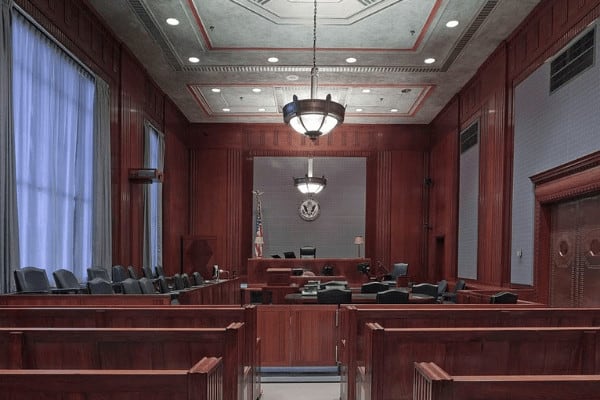
Following the death of a person, you typically need to go through probate in the courtroom, which allows you to award property and items based on the deceased's wishes.
Why Death Records Matter
Death records matter for a few different reasons. One of the biggest is that you might not find any other records relating to that person. Let’s say that you had a great uncle who enlisted in the Army during World War I. Not everyone born in the late 19th and early 20th centuries had traditional birth certificates. Many of the men and women from this era were born at home. They did not need birth certificates to get a driver’s license or start school. If your uncle died in the war or after returning home and never married, the only way you can learn about his life is through his death certificate. Keep in mind that when looking for older people that you may not find anyone still living who knew that person.
Another reason death records are important is that you may need to prove that someone passed away. This is common in the modern era when you may share a property with that person. If you moved into your spouse’s home and did not add your name to the mortgage or deed, you do not have a legal right to that home. The federal government added a new rule that allows the spouse of a deceased person to take over the mortgage and prohibits the lender from changing the rules of the loan. You’ll need to contact the lender with a copy of the death certificate and prove that you lived in the home when the individual passed away.
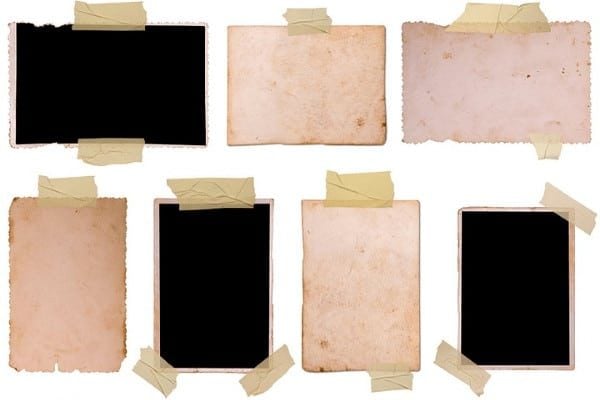
Check the city or county courthouse where the deceased lived to find out if his or her will is on file. You may find a copy of the will in the person's home too.
Probating an Estate
You also need a copy of the death record to go through probate. Most states in the country require probate before you can give property or items to anyone else. You will meet with a lawyer to go over the copy of the deceased’s will, which outlines what he or she wanted to do with the property. This can include any homes or vehicles that the person owned as well as items that they wanted to give to specific people. The probate process makes it legal for you to move into a home and put the property in your name. It also allows you to give items to those listed in the will.
Intestate Death
Many states in the country have laws or rules regarding what happens when someone died intestate, which means passing away without a will. This gives the state where the person died the final say in dividing up the individual’s property. If you take anything from the home before the process is done, the court may require that you give it back or that you pay for it. The court will usually assign the property to the next of kin such as the spouse or the child. If the deceased had more than one child and no living spouse, the court will equally divide the property among them. You need the death record to show that the person died and to start the process.
How Soon After a Death Should You Meet with an Attorney?
The time that you have to meet with an attorney after the death of a loved one depends on where the person lived. It can take up to a full year to go through probate and even longer for larger estates. You generally want to meet with an attorney in the first few weeks to determine your next steps.
Loans and Utilities
Don’t forget that you need copies of the death report to handle the loans and utilities of the deceased. When a person dies, his or her spouse needs to have all utilities switched into their name. Though many companies charge deposits for any changes to their services, they may waive this fee when handling cases where someone passed away. You’ll need the death record to make changes to any loans too, including the mortgage on a shared home and a car loan that the deceased had. While you may want to transfer the loan into your name, you can also cancel the loan and let the lender take back the property.
Life Insurance
You may need a copy of the death certificate to get the deceased’s life insurance policy too. This policy can come from the individual’s place of work, a bank or a private insurer. You usually need to call the insurer and identify yourself as the beneficiary of the policy. As long as you answer the questions correctly, the company will release the funds. The funeral home can bill the company directly, which lets the insurer cut you a check for the balance on the policy and help you avoid the hassles of paying the funeral home first.
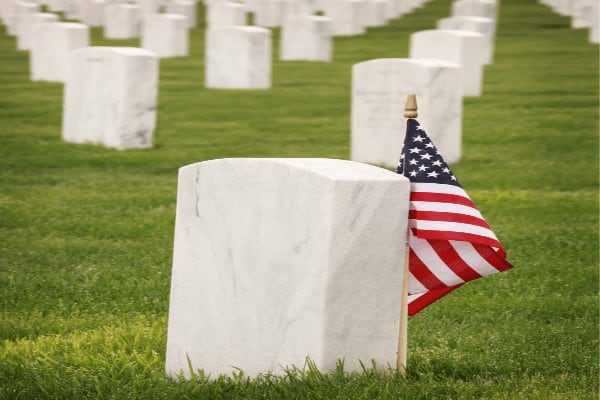
You may need a copy of the death certificate and proof that your loved one served in a branch of the military to have that person buried in a military cemetery or with full honors.
Stop Bill Collectors
Some unscrupulous bill collectors will go after the families and loved ones of deceased people, especially if they think that you’ll pay bills that do not belong to you. You are typically not responsible for the debt that belonged to another person unless you cosigned on the debt. If a bill collector or lender keeps calling you and demanding that you pay the debt, you can use the death certificate to prove that the person passed away.
Lost Funds
Most states have a department that is responsible for keeping track of lost or missing funds. You can usually visit the department’s website and enter your name to search for lost funds. Once you prove your identity, you’ll get a form in the mail that you can complete and send back to get your money. Those who passed away may have funds issued in their names too such as bank accounts they never closed or their last paychecks. You can use a death certificate to show that you are the person’s next of kin and that the funds should go to you.

Using a death record can keep you from taking over the debt that a loved one had.
How Historical Death Records are Compiled
When you look for marriage records online, you’ll typically find that those records come from both churches and courthouses. Most of the historical records that you find come from the churches that the people attended as well as those attached to cemeteries and where the deceased had their burials. The National Archives maintains a large database of death records that it obtains from each state. When people die, the state must notify the government, which puts a hold on the individual’s social security number to stop anyone from using it. The information on those records often comes from the nursing home or hospital where the person died. If the individual had an autopsy performed, the official record will come from the coroner.
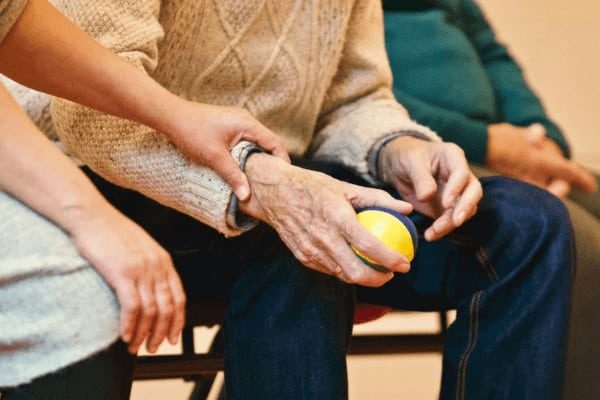
When an elderly person passes away in a nursing home, the director is often responsible for providing some of the information found on the death certificate.
Where to Find Historical Death Records
There are quite a few places where you can find death records, including the Social Security Death Index. The Social Security Administration launched in 1935 and began assigning citizens social security numbers. Those born after this date receive a number in the hospital. Anyone born at home or in a nontraditional setting can apply for a number with a copy of their birth certificate. Most of the records that are available today date from 1962 and later. This was when more women began having their babies in hospitals. Anyone who had a social security number and passed away should appear in the Social Security Death Index.
You should also check with the Department of Vital Records in the state where the person lived or died. Vital records include both marriage and death certificates as well as divorce and birth records. Some of the other places you may want to look include:
- The cemeteries where individuals were buried
- Military records if they died in battle or while enlisted
- Family Bibles
- Historic books
- County registries
- Old newspapers
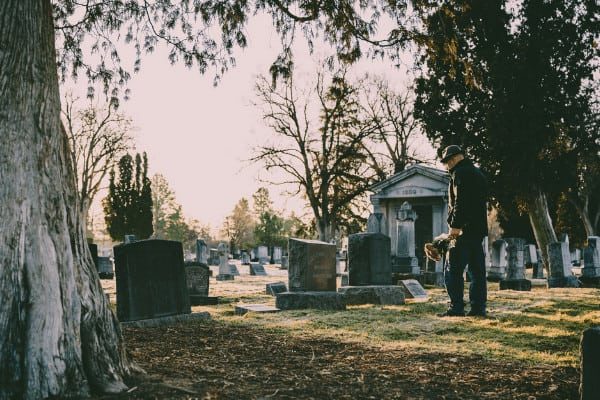
Cemeteries often keep detailed records that include more information than what you see on a headstone.
Historical Death Records and What They Reveal
Looking at historical death records can give more information about a person than you would find anywhere else. If you want to see what happened to family members who died before you were born, you can use those records to learn about their families and lives. Official death records typically list quite a bit of information that you can use when doing genealogical research too.
Cause of Death
The most important piece of information found on a death record is the cause of death. This can include both primary and secondary causes of death too. A good example is someone who died of a cardiac arrest. While the coroner will list a heart attack as the main cause of death, they might list other causes that contributed to it too such as diabetes or kidney disease. A cause of death only appears on the death record if the coroner performed an autopsy. It might instead state that the person died of natural causes. This was common during the influenza outbreak and other eras when coroners did not have time to do autopsies on every person.
Place of Birth
Another piece of information found on a death certificate is the birthplace of the individual. One thing to keep in mind is that this might not be accurate. Let’s say that your grandfather was born in Miami but spent most of his life in a small town outside of the city limits. The funeral home will ask the loved ones for his birthplace and note the city they stated, which will appear on both the death certificate and in the obituary. Historical death records may contain information that doesn’t match the records that you have due to misspellings and mistakes.
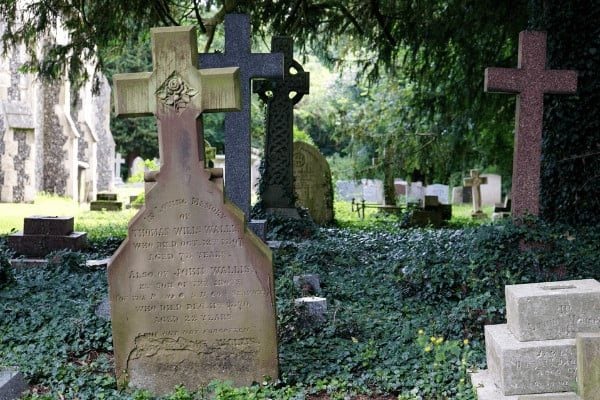
The cemetery that buried your loved one will use the information from the death certificate on the headstone.
Spouse's Name
The official death record will list the name of the individual’s spouse, even if that person passed away. This section often appears around the middle of the certificate and in a section labeled as the bio. If the individual was married more than once, it will only list the name of the last spouse. Some states do not include a spouse’s name unless the person is still married. If your parents divorced and your mother passes away, her death certificate will state that she’s divorced. The report may also list an individual as a widow and include the name of the former spouse.
Parents' Names
Death records often include the name of the deceased’s parents if known. The official report will get this information from the deceased’s loved ones, which is why you might find some issues in the report. Someone might spell one of the parent’s names wrong or list the wrong birthplace for that parent. When doing genealogical research and working with older documents, don’t focus too much on similar names. You might see that someone had a father named Jack when your research shows that the person’s father’s name was John. Older records may list nicknames for one or both parents rather than their given names.

The old handwriting script used on death certificates is sometimes hard to read, which might account for some of the mistakes that you see.
Old vs. Modern Death Records
You’ll notice some big differences between historic and modern death records. Cemeteries often maintain records that include information about those buried there. Most of these records simply list a general cause of death along with the name of the person and where he or she died. Records from the 21st century and beyond include more data. You can see the age of the deceased along with his or her:
- Age
- Date of birth
- Birthplace
- Cause of death
- The name of the person’s next of kin
- How long the individual lived at the last known residence
- The funeral home that handled the arrangements
You can also get the individual’s social security number from one of these records. Death certificates began adding a social security number in 1950. If the person had no known next of kin, the record may not have all this information because the person who wrote the record could not complete it.
Searching Death Records in Modern Times
To search for death records in modern times, we recommend relying on a few tips that we found.
- Don’t focus too much on free sites: As much as you want to save money, you shouldn’t expect to find all death records available for free. Using a premium site with a paid subscription service gives you access to records that you wouldn’t find anywhere else.
- Conduct personal interviews: Whether looking for an old friend or an ancestor, conduct personal interviews with people who knew that individual. They may reveal details that you never knew that can help you expand your search.
- Check unidentified body websites: Though you don’t want to admit it, someone you knew may be deceased and unidentified. These websites provide information on John and Jane Does found around the world. Not only can you search by gender or an age range, but you can also set a height range or view those with certain eye/hair colors.
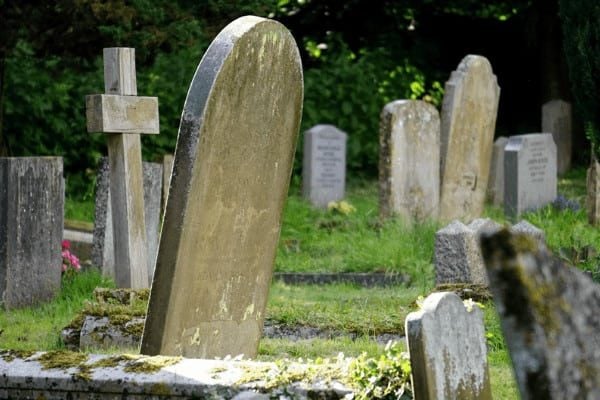
Historic cemeteries are a great source of information because their headstones might be the only record of a person's life and death.
How Does Death Records Search Work?
You can start your death records search in the same way that you would handle a criminal records search. We highly recommend checking out the links on our homepage to view the top sites for doing background checks. Many of those sites give you a basic report that tells you if the person is deceased. Though the process varies depending on which website you choose, you usually need to do just a few things, including:
- Enter the full name of the deceased
- Compare the dates listed to find the right person
- Broaden your search to neighboring states
- Look at the records of both where the person lived and died
Consider looking at census records too, especially if you aren’t sure when a person died. As long as you know the individual’s name, you can find the last known census record where that name appeared. If his or her name doesn’t appear in any later census records, you can narrow down the year of the person’s death within that decade.

We ranked the top websites that you can use to access death records on the web.
Where to Look for Online Resources
If you wanted to track down arrest records to see if an employee had a criminal past, you would head to the city or county where the worker lived to search the court records. When searching for death records online, you’ll want to look at those cities and counties too. Though every state has a Department of Vital Records, not all states offer free or online access to their records. To get a death certificate, you usually need to complete a form that lists the person’s name and place or date of death. The cost of getting this record can range from a few dollars to $20 or more, which doesn’t include your shipping and handling charges. If you do not know all the information that you need to request a death certificate, you might look at other online resources to find that data, including church and cemetery records and military databases.
Though many states began recording death records around the turn of the 20th century, others did not start collecting those records until 1920 or even 1930. You might find that historical death records are only available from ancestry and genealogical research sites such as those operated by the Jesus Christ Church of the Later-Day Saints. Family websites may contain digitized records that you can use too.

Online resources let you search for death records on your next work break.
Start Your Research Today
Now that you know some of the reasons why you might need death records, it’s time to start your search. Here at OurPublicRecords, we help you find the police records that can help you hire someone to watch over your child or handle business at work. We do more than just help you find the best resources for doing background checks because we can also help you find missing friends and loved ones. Don’t spend another day wondering what your college sweetheart is up to now. You can use our help to find that person and make sure that they’re still around.
OurPublicRecords can also help you find death records when you need to settle a dispute that you thought you handled years ago. When you lose someone special, you’re not always in your right frame of mind. It’s easy to make mistakes such as forgetting to turn off a utility bill or closing a bank account. With an official death certificate, you can prove that you are the next of kin and get funds issued in that person’s name. A death record can help you find a property that you never knew your loved one owned too. Trust OurPublicRecords to help you find both older and modern death records.
Quickly and Easily Search Almost Anyone's:

Disclaimer: We rank sites based on our knowledge and experience. Our team visits each site and evaluates each one before placing it online. Though we do accept referrals, we guarantee that the information we share is accurate and that we will only pass on information that we think is helpful to our visitors. The referral fees that we receive go to paying our team and keeping our website operational.
OurPublicRecord.Org is a privately owned and operated website and is NOT affiliated with the US Government or any law enforcement agency.